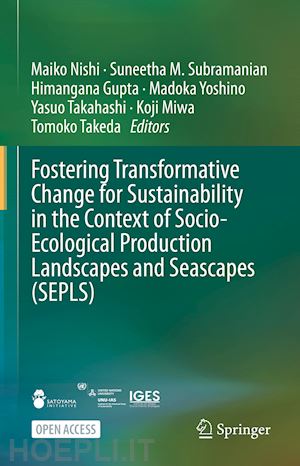Dr. Maiko Nishi is currently working as a Research Fellow at United Nations University Institute for the Advanced Study of Sustainability (UNU-IAS). She holds a PhD in Urban Planning from Columbia University, City of New York, the United States, an MA in Development Studies from the Institute of Social Studies, the Hague, the Netherlands, and a Mater’s of Engineering from the University of Tokyo, Japan. Her area of research interest includes social-ecological system governance, local and regional planning and agricultural land policy. In particular, her interest lies in multi-level governance, land tenure and use, and subjectivities of institutional actors in governing natural resources.
Dr. Suneetha M Subramanian is currently a visiting fellow with the United Nations University-Institute for the Advanced Study of Sustainability and the Institute for Global Environmental Strategies, Japan. She has more than 15 years of experience in international and sub-national research and capacity building activities relating to biodiversity and human well-being with a specific focus on equity, traditional knowledge, linking policy goals to local priorities and community well-being, assessment of changes to ecosystems and human wellbeing, socio-ecological resilience, and joint implementation of policies and actions on Health and Biodiversity at the community level. She has been involved in various assessments of IPBES as Lead/ Coordinating Lead author and is on the Editorial board of the Sustainability Science Journal and the Journal of Ecosystems and People.
Dr. Himangana Gupta is a JSPS-UNU Postdoctoral Fellow at the United Nations University Institute for the Advanced Study of Sustainability (UNU-IAS) and The University of Tokyo, Japan. She has worked on climate change and biodiversity policy and diplomacy, and is currently working on linkages between biodiversity, climate, and communities in socio-ecological production landscapes. Before this, she was a part of the National Communication Cell (NATCOM) of the Indian Ministry of Environment, Forest and Climate Change. She contributed to India’s Second Biennial Update Report and several other publications of the Ministry. She is a Certified Expert in Climate Adaptation Finance. She received her doctorate in Environment Science from Panjab University, India, in 2015. She is a University Gold Medallist and recipient of Academic Excellence Award. She has published two edited books with Springer and has also written research papers in reputed international and national journals on climate policy, forestry, biodiversity, and women in climate change mitigation and adaptation.
Ms. Madoka Yoshino is currently working as an Programme Associate for the International Satoyama Initiative at the United Nations University Institute for the Advanced Study of Sustainability in Tokyo, Japan. As a Fulbright Scholar, she received Master of Public Affairs and Master of Science in Environmental Science (Environmental Policy and Natural Resource Management, Policy Analysis, and Water Resources) from Indiana University O’Neil School of Public and Environmental Affairs, Bloomington, Indiana, the USA, and Master of Agriculture (Environmental Science in Biosphere and Water Pollution) from Tokyo University of Agriculture and Technology, Tokyo, Japan. She is also a Fellow (Climate Change) at the Institute for Global Environmental Strategies.
Mr. Yasuo Takahashi, a Research Manager at the Natural Resources and Ecosystem Services Area of Institute for Global Environmental Strategies (IGES), is an expert of biodiversity conservation and ecosystem services valuation. He obtained his BSc from the Faculty of Agriculture, Hokkaido University in 2002 and MSc from the Darrell Institute for Conservation Ecology, University of Kent, UK in 2010. He was involved in the Intergovernmental Science-Policy Platform on Biodiversityand Ecosystem Services (IPBES) Regional Assessment of Biodiversity and Ecosystem Services for Asia and the Pacific as a fellow from 2015 to 2018.
Mr. Koji Miwa is currently working as a policy researcher at the Natural Resources and Ecosystem Services Area of Institute for Global Environmental Strategies (IGES). He completed his M.S. in International Relations from Stockholm University, Sweden in 2014. He has worked in both research and project implementation at the grassroots level, combining and synergizing both factors. His research and projects have focused on disaster management, blue carbon ecosystem management, ecosystem services valuation, and sustainable agriculture, forest conservation and restoration with participatory approach.
Ms. Tomoko Takeda is a Policy Researcher at the Institute for Global Environmental Strategies, Japan. She was awarded an M. Eng with honours from the Department of Urban Environmental Engineering, the











